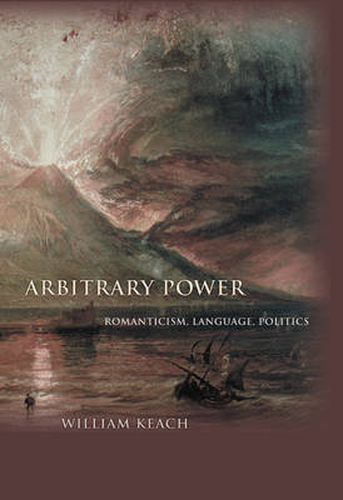Readings Newsletter
Become a Readings Member to make your shopping experience even easier.
Sign in or sign up for free!
You’re not far away from qualifying for FREE standard shipping within Australia
You’ve qualified for FREE standard shipping within Australia
The cart is loading…






This book explores previously unexamined links between the arbitrary as articulated in linguistic theories on the one hand, and in political discourse about power on the other. In particular, Willam Keach shows how Enlightenment conceptions of the arbitrary were contested and extended in British Romantic writing. In doing so, he offers a new paradigm for understanding the recurrent problem of verbal representation in Romantic writing and the disputes over stylistic performance during this period. With clarity and force, Keach reads these phenomena in relation to a rapidly shifting literary marketplace and to the social pressures in Britain generated by the French Revolution, the Napoleonic Wars, and the class antagonisms that culminated in the Peterloo Massacre. The question of what it means to think of language or politics as arbitrary persists through postmodern thinking, and this book advances an unfinished dialogue between Romantic culture and the critical techniques we currently use to analyze it. Keach’s intertwined linguistic and political account of arbitrary power culminates in a detailed textual analysis of the language of revolutionary violence. Including substantial sections on Blake, Wollstonecraft, Wordsworth, Coleridge, Byron, P. B. Shelley, Keats, and Anna Jameson, Arbitrary Power will engage not only students and scholars of eighteenth- and nineteenth-century literature but also those interested in critical and linguistic theory and in social and political history.
$9.00 standard shipping within Australia
FREE standard shipping within Australia for orders over $100.00
Express & International shipping calculated at checkout
This book explores previously unexamined links between the arbitrary as articulated in linguistic theories on the one hand, and in political discourse about power on the other. In particular, Willam Keach shows how Enlightenment conceptions of the arbitrary were contested and extended in British Romantic writing. In doing so, he offers a new paradigm for understanding the recurrent problem of verbal representation in Romantic writing and the disputes over stylistic performance during this period. With clarity and force, Keach reads these phenomena in relation to a rapidly shifting literary marketplace and to the social pressures in Britain generated by the French Revolution, the Napoleonic Wars, and the class antagonisms that culminated in the Peterloo Massacre. The question of what it means to think of language or politics as arbitrary persists through postmodern thinking, and this book advances an unfinished dialogue between Romantic culture and the critical techniques we currently use to analyze it. Keach’s intertwined linguistic and political account of arbitrary power culminates in a detailed textual analysis of the language of revolutionary violence. Including substantial sections on Blake, Wollstonecraft, Wordsworth, Coleridge, Byron, P. B. Shelley, Keats, and Anna Jameson, Arbitrary Power will engage not only students and scholars of eighteenth- and nineteenth-century literature but also those interested in critical and linguistic theory and in social and political history.